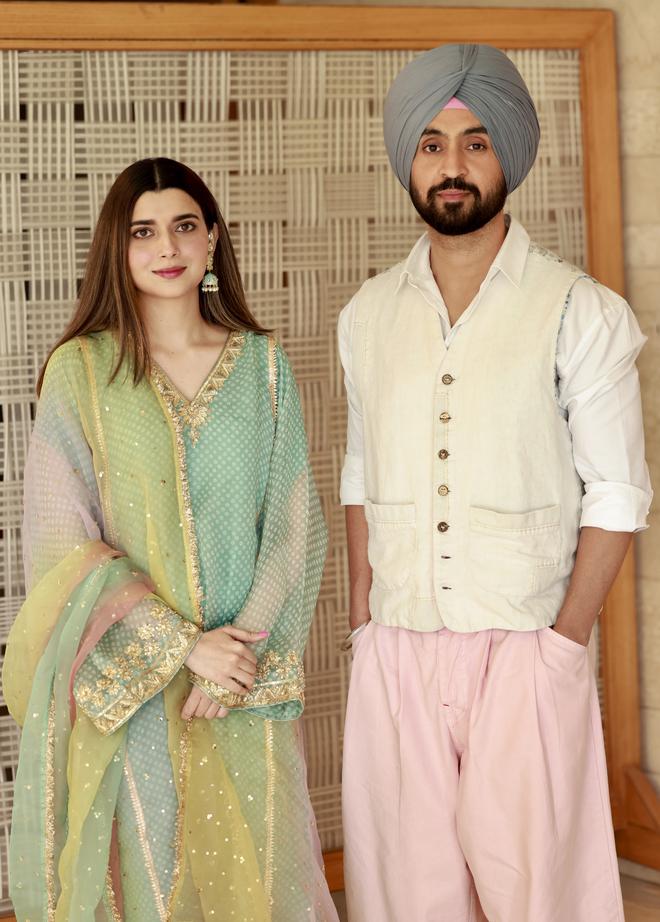It is perhaps Diljit Dosanjh’s chest-thumping Punjabiyat that arrested the audience and music aficionados at Coachella Valley Music and Arts Festival last month. Exuding lingual pride and garnished with the traditional fashion vocabulary of the region’s hinterlands, videos of him in a kurta, chaadra (or tamba, Punjabi-style lungi) and turlay wali pagg (pleated-fan turban) at the iconic annual music festival, held in California’s Colorado Desert, went viral.
Chandigarh is his first stop in India after the performance, which courted both accolades (for becoming the first Indian to perform at one of the biggest music festivals of the world) and a row over the Indian flag. Streetwise, yet reticent and reserved, Diljit likes to corner himself from controversies. “I like to stay away from negativity.” he says.
The singer-actor’s general demeanour is punctuated by composure: he does not let success get to his head, nor is he bogged down by trolls. That’s his X-factor.
Diljit ploughs on, now promoting his film Jodi that will be released on May 5.

At The LaLiT, he is accompanied by Punjabi singer-actor Nimrat Khaira. The duo will be playing rural musicians crooning at akharas (small stages where singers performed for a village audience in Punjab, which were a popular source of entertainment until late ’90s) in Jodi. “I signed the film in 2018 because its story, I felt, is interesting,” he says in Punjabi, dressed in pale-pink, wide-leg pants, a white shirt and a waist coat that exudes quiet luxury.
Diljit was initiated into singing at the age of seven by his sister’s tuition teacher who was fond of writing poetry and would ask Diljit to recite his poems. “My sister was studious and I had to accompany her to tuition. Her teacher realised I wasn’t interested in studies and made an offer: a day off for each poem recited. I took it. Soon, all my village school teachers started addressing me a kalakaar (artist), so I started believing that I am one.”
Now aged 39, Diljit is clocking 21 years in the entertainment industry. With nearly 15 albums under his belt, he collaborated with English singer-songwriter Anne-Marie and Canadian rapper Tory Lanez last year. He has witnessed Punjabi music industry’s technological evolution, from his first album Ishq Da Uda Ada, released on cassettes and CDs, to his new film’s song on all digital music apps. “In 2002, cassettes started phasing out and CDs were taking over. Those days, music companies would select musicians who they thought sang well and artistes were often bound by a five-year contract,” he says.
Diljit points at the math behind production and distribution of music to explain how the Internet democratised it. “For the longest time, Punjabi singers didn’t claim royalties; our contracts were such. Only HMV gave royalties to Punjabi singers; music composer Charanjit Ahuja, who was also associated with HMV, told me that he got maximum royalties from Amar Singh Chamkila’s songs. I was shocked to hear that! I was under the impression that singers made money only through performances. Now, times have changed. Youth are releasing, distributing their songs and own their rights too. The Internet has given everyone an equal opportunity to put their music out on platforms like Spotify and Apple,” he says.
Since 2011, Diljit has acted in about 29 films, including Bollywood blockbuster Udta Punjab. However, he identifies as a singer first and then an actor. Between the Punjabi film industry and Bollywood, Diljit says the only difference is that of language.
After Jaspal Bhatti, he is the only turbaned Sikh to have acted in Bollywood. He says he is mindful of how Sikhs are represented in Bollywood, eager to break the community’s comic image.
When starting out, he faced a similar problem in Punjabi films too. Diljit’s first film The Lion of Punjab flopped at the box office. “The producer said the film didn’t do well because I wore a turban and that’s why youth didn’t come to watch it. I agreed. Fair enough! Incidentally, I had already shot another film Jinne Mera Dil Luteya before my first film released. If I hadn’t shot that film, I would not have continued acting because I genuinely believed the producer. But Jinne Mera Dil Luteya broke all records. It was a success. So, I continued acting,” he shares.
Diljit will soon be seen playing Punjab’s iconic Dalit singer Chamkila, who was gunned down at Mehsampur in 1988, in Imtiaz Ali’s eponymous biopic. It is an irony though, considering that many of Diljit’s songs have come under the scanner for promoting violence (like in Goliyan and Jatt Fire Karda) and sexism (for instance Lakk 28 Kudi Da). “I first compose a song, then, I start mounting lyrics on the tune. Lyrics are important, but composition is the main thing,” he says.
About violence, Diljit feels movies and music should be judged on equal parameters. “Those who take music seriously have their own reasons. But just like films, songs have subjects too. If issues like violence are being addressed particularly in connection with songs, then movies should be looked at through the same lens. But, that doesn’t happen. We see action in Hindi and English films too.”
Diljit’s hustle has reaped fame and popularity that pits him on the global map like no other Punjabi musician. He wrote history at Coachella, but deep down, this Punjabi lad’s heart aches for a sense of home. “I was born in Punjab and I carry the scent of its soil with me wherever I go. I haven’t thought of one place as home. I don’t stay at any place for more than three days. I don’t have a home, to be honest. My home is wherever work takes me. I no longer associate myself with either people or places; it’s inbuilt,” he says as he packs and leaves for another set of interviews, posing for the cameras, to a place where he probably truly belongs: the stage.







